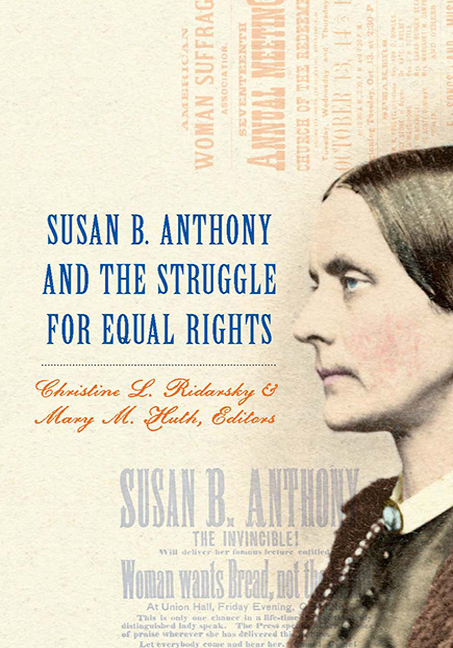Book contents
- Frontmatter
- Dedication
- Contents
- Preface
- Introduction
- Part 1 Constructing Memory
- Part 2 Anthony and Her Allies
- Chapter 2 “To Bury the Black Man and the Woman in the Citizen”: The American Equal Rights Association and the New York State Constitutional Convention of 1867
- Chapter 3 “I Pray with My Work”: Susan B. Anthony&s Religious Journey
- Part 3 Broadening the Boundaries of the Equal Rights Struggle
- Part 4 Reconstructing Memory
- List of Contributors
- Index
Chapter 3 - “I Pray with My Work”: Susan B. Anthony&s Religious Journey
from Part 2 - Anthony and Her Allies
Published online by Cambridge University Press: 09 May 2017
- Frontmatter
- Dedication
- Contents
- Preface
- Introduction
- Part 1 Constructing Memory
- Part 2 Anthony and Her Allies
- Chapter 2 “To Bury the Black Man and the Woman in the Citizen”: The American Equal Rights Association and the New York State Constitutional Convention of 1867
- Chapter 3 “I Pray with My Work”: Susan B. Anthony&s Religious Journey
- Part 3 Broadening the Boundaries of the Equal Rights Struggle
- Part 4 Reconstructing Memory
- List of Contributors
- Index
Summary
In 1876, Illinois suffragist Elizabeth Boynton Harbert, a young mother with three children under the age of five, caught herself in a faux pas. She had failed to respond in a timely way to her friend and mentor, Elizabeth Cady Stanton. But Stanton, who clearly understood the divided loyalties of motherhood and politics, reassured her: “With three children, & housekeeping, no one should ask you to do another thing.” Moreover, “As Susan & I are one & that one is Susan, I feel my letters from you are answered.” Stanton playfully invoked the dreaded language of marriage law that rendered a woman, once married, legally invisible, a source of consternation for nineteenth-century woman's rights advocates. Stanton did not mean to suggest that she was rendered invisible by her “marriage” to Susan B. Anthony; rather, she reaffirmed the covenant of solidarity that bonded her with her friend and colleague. Stanton and Anthony were not married, obviously, but they shared a common purpose and, apparently, read each other's mail.
Stanton had long relied upon the metaphor of marriage to convey her sense of commitment to Anthony and their shared campaign. In the midst of a western speaking tour in 1869, Stanton resisted Anthony's request to come east for the annual convention but nevertheless pledged her unequivocal support: “But if your life depends on me, I will be your stay and staff to the end. No power in heaven, hell, or earth can separate us, for our hearts are eternally wedded together. Ever yours, and here I mean ever.” In another exchange in 1892, Stanton wrote to Anthony to report that the New York Sun had announced the dissolution of their partnership. “Have you been getting a divorce out in Chicago without notifying me?” Stanton quipped. “I should like to know my present status.” Over time, however, Anthony and Stanton increasingly locked horns over the place of religion in the evolving woman's rights movement. To preserve the “marriage,” they agreed to disagree. As Anthony put it: “You say ‘women must be emancipated from their superstitions before enfranchisement will be of any benefit,’ and I say just the reverse, that women must be enfranchised before they can be emancipated from their superstitions.”
- Type
- Chapter
- Information
- Susan B. Anthony and the Struggle for Equal Rights , pp. 86 - 114Publisher: Boydell & BrewerPrint publication year: 2012

